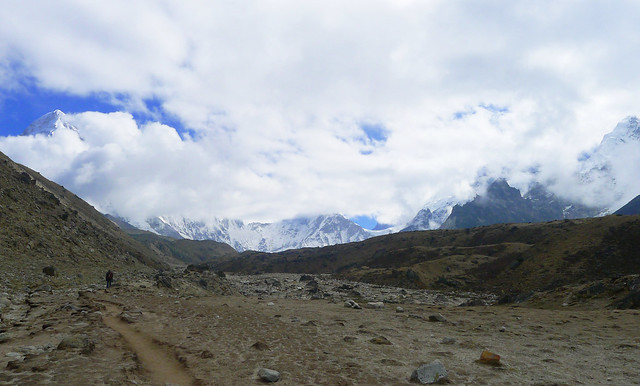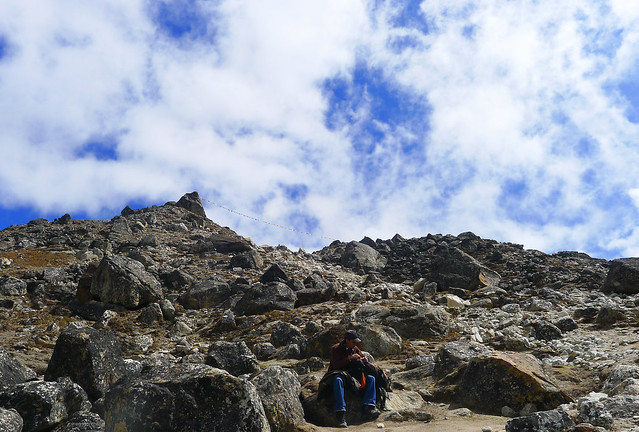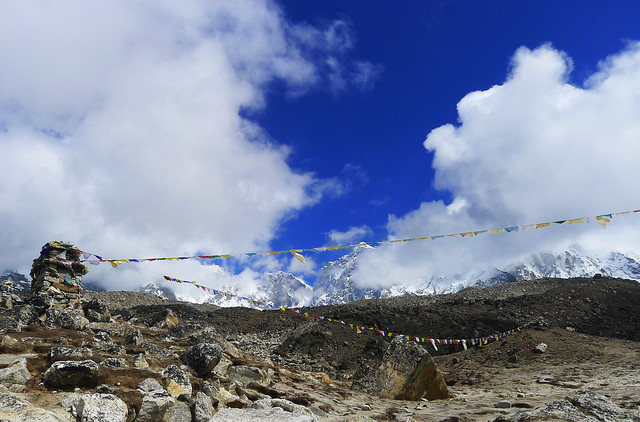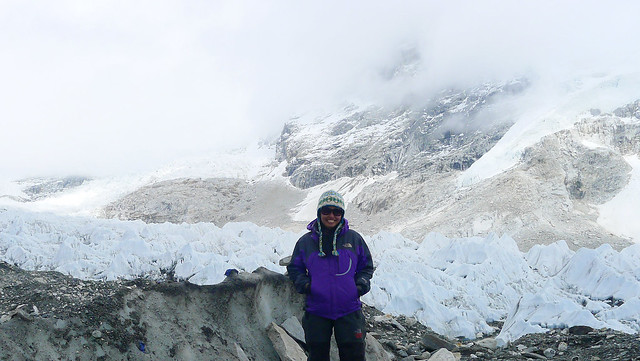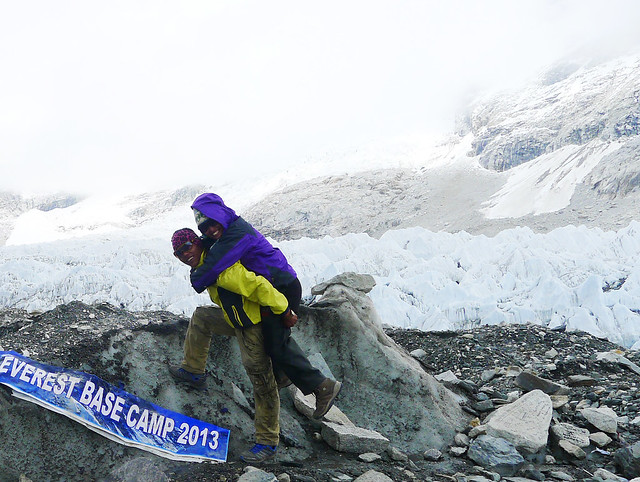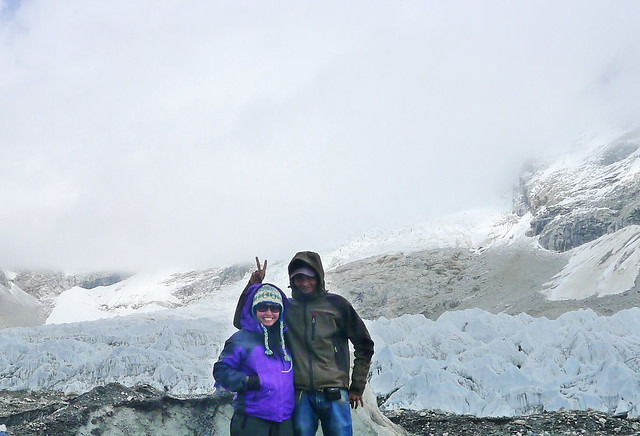To read all posts on my Everest Base Camp trek, click here for the complete series.
Days 9 to 12: June 6-9, 2013
After the exhilaration of reaching Everest Base Camp (and writing about it), I know it seems a bit anti-climactic to cover the 4-day trek back to Lukla. But for the sake of people who happen to drop by this little blog and are wondering what to expect after reaching the foot of Mount Everest --well, here it is.
As I've mentioned in previous posts, it takes eight days to reach EBC and four days back down, covering almost the same path. Why four days only? Naturally, descent is faster, and as you go further down, more oxygen starts to fill up your lungs. This then results in your body recovering from oxygen deprivation and you begin to feel a whole lot better. Just doing a descent of 600-900 meters already does wonders.
As I trekked for four days from Gorak Shep to Pheriche to Tengboche to Monjo and back to Lukla, I was feeling stronger, faster. The triumph of reaching Everest Base Camp erased all remaining worries from my head about altitude sickness because I was heading "down" already. "Down" meant lower altitude but it did not take away the fact that I still had to deal with alternating uphills and downhills on the way back.
But the body does recover significantly better after descending from a height of 5,000+ meters, so even the uphills at lower levels did not bother me anymore. I was practically cruising along the path, despite the pressure on the knees during some places where we were doing continuous descents.
By this time, I was more comfortable about the path ahead; I could afford to tune out a bit from the rest of the world, put on my earphones, and listen to music on my iPhone. I let Madan and Dhan Kumar walk ahead and I just followed them, enjoying some music at last. I had been music-deprived for the past eight days because I was conserving phone battery most of the time and I did not want any distractions on the path heading up to Base Camp.
On Day 9, as we headed down to Pheriche, I slipped on a part of the path that was muddy and I fell on my butt. We weren't even in completely muddy terrain. And then 30 minutes later, I tripped on a root because I was too busy singing along to The Strokes.
Madan and Dhan Kumar had worried looks on their faces, but I was laughing as I hauled myself up on those two occasions. I had gone up to Everest Base Camp without falling and without any serious injuries. But here I was, the day after, falling on the ground twice. So lesson learned here is: remain safe and cautious on the trek even after you've achieved Base Camp!
They were my last--and only--minor accidents throughout the whole 12-day trek. I think I've done extremely well in this trip, just getting away with two minor incidents and a blister on my right foot. I didn't even feel any sprain on the ankle nor did my butt hurt afterwards. Overall, I've been one hell of a lucky girl.
Fellow trekkers
I kept running into trekkers who were on their way to Base Camp and I made sure to say hello to all of them. I was basically paying it forward. Many times along the path up to EBC, trekkers who were heading back to Lukla would greet me and wish me luck. When you're struggling with the altitude and the uphills, a cheery greeting from a stranger is sometimes all you need to feel better. The community spirit is incredible up in the Himalayas, and any well-meaning traveler would simply want their fellow trekkers to stay safe on the path.
Two guys asked me how far it would take to reach Gorak Shep, and it felt nice to help and give them advice. An American also asked me about the weather conditions in Everest Base Camp; he was to reach it in the next one or two days, and was also planning on summitting nearby Mount Kala Pattar (5,555 meters / 18,204 feet).
A Chinese national also approached me back down at Thukla; he thought I was Chinese too. I wished him luck and watched him take on that difficult hill up to Dugla Pass on an extremely foggy day. I knew all too well how that hill was such a challenge.
Tengboche
Tengboche is one of the most picturesque places in the entire Everest Base Camp trail, so if you're doing the trek, make sure to stop here for a day to really see the area. I passed through Tengboche back in Day 4 on the way to Pangboche, but it was only for lunch. Now that we were journeying back to Lukla, it was great to arrive here in the early afternoon of Day 10, check in at our Tengboche teahouse for an overnight stay and stroll around this small village settlement.
Madan took me to the Tengboche Monastery, where, at 3:00 pm, guests are allowed to hear the monks chanting from their prayer books. It is a beautiful and solemn ceremony. I sat there with fellow trekkers, entranced by what seemed like a graceful, never ending ebb and flow of words being chanted by the head monk, with the other monks seamlessly joining in on the chanting at certain moments. The chanting was rapid--so rapid that it had a hypnotic humming-like quality to it.
We were not allowed to take photos or record anything during the ceremony. Only after it was done could we take photos of the prayer room.
The owner of the teahouse we stayed in (with the very original name of Tengboche Guest House) was a bustling, motherly woman who prepared for me the most delicious hot chocolate and dal bhat ever. I was indeed a happy camper in Tengboche.
Reaching Lukla -- and the Delayed Flight Back to Kathmandu
The air became significantly warmer in the last two days of the trek. Stuffed my gloves, wool hat, and fleece jacket into my day pack as we went past Monjo and were nearing Lukla. We covered around 7 to 8 hours of trekking that last day.
When I did my final uphill and crossed the archway leading into Lukla, I was close to tears because I had really, truly completed what I had obsessively set out to do. I suppose Everest Base Camp puts every trekker in a highly emotional state. I know I was feeling all sorts of things as I crossed that archway --triumph, exhilaration, exhaustion mixed with an unusual feeling of superhuman strength, and even a growing anxiety over bidding the Himalayan landscape goodbye very soon.
This 12-day experience remains to be one of my life's proudest moments, because not everyone can say they've been there and done it. It is naturally not the same as the sweet victory of summiting Everest, but hey, Everest Base Camp is still not an easy trek and it never will be.
We stayed again at The Nest in Lukla, and had a celebratory pizza and pasta dinner that evening. Madan was to fly back with me to Kathmandu the next day but I knew it was Dhan Kumar's last night with us, so I was feeling some sort of separation anxiety already about my porter, who was like a younger brother to me all throughout the trek.
But then, I was meant to stay another day in Lukla because as luck would really have it, there have been no flights out of Lukla for the past 7 or 8 days. I woke up the next day and knew immediately, upon seeing the thick fog that enveloped the entire town, that flying out on a plane was a no-go. This was a scenario I was indeed expecting months back when I was planning the trip, but I still had trouble believing I was in that unfortunate situation.
Spent that day fretting and making calls to my travel agent, who was on standby to rebook my international flight should I really be stuck in Lukla for a while. Madan was on the phone with Naba, coordinating for a possible helicopter ride out the next day for me. He also made sure that I was on the first flight out the next day, should the weather indeed allow planes to fly.
Once more, I really appreciated the value of having a guide and a trekking agency to handle such logistics in my behalf. I think many trekkers can do such arrangements themselves, but that does create some additional stress. And when you've just completed a 12-day trek and you're physically and mentally exhausted, one of the last things you'd feel like doing is arranging transport logistics for a way out of Lukla.
Unbelievably enough, the skies were clear the next day. Madan and I found ourselves rushing up the steps heading to the Tenzing-Hillary airport of Lukla along with other stranded trekkers and locals -- all of us so eager to fly out to Kathmandu. I was only stuck in Lukla for a day, but I can just imagine how others (who may have been stranded for days and could not afford a chopper ride) were desperate to leave. When the siren sounded--indicating that the first flight will proceed as scheduled--everyone in the airport actually cheered.
Never expect things to be completely dull up in the Himalayas.
The first plane came and landed, bearing passengers from Kathmandu. We were to ride on that plane heading back to the capital. The time it took to land, taxi, for the ground crew to handle baggage and for the outbound passengers to finally board took all of 20 minutes. TWENTY MINUTES! Gadzooks. I had never seen such incredible turnaround time ever. And by the time we were boarding, the second plane had arrived and was taxiing up the short runway.
As the plane effortlessly took to the skies, I sat and craned my neck for glimpses of Everest and its neighboring mountains--these beautiful giants which I spent the past 12 or so days with. Reaching Base Camp was insanely hard, and it's honestly no picnic all throughout -- but I understand now the incredible lure of the Himalayas and why people keep coming back to this country. I thought doing Everest Base Camp this year would be my first and last time to see Nepal (as there are so many other countries I want to visit in my life), but I found myself already planning on when to see the Himalayas again while sitting on the plane.
The Nepalese language does not have any exact word for the term 'goodbye.' This seems wonderfully appropriate somehow because one can never really say goodbye to Nepal anyway. Namaste means hello in Nepali, and it is also what the locals say as a form of goodbye. And pheri bhetaula means 'see you again.'
So yes, there are no goodbyes for you, Nepal -- just 'namaste, pheri bhetaula' because I know that I'll be seeing you again someday.
* * *
If you want the same Everest Base Camp trek experience I had, visit Himalayan Planet Adventures and go for the 16-day Everest Base Camp trek package.
 |
| At Pheriche (4,200 meters / 13,776 feet), heading back down to Tengboche. Dhan Kumar ahead of the pack, as usual. |
Days 9 to 12: June 6-9, 2013
After the exhilaration of reaching Everest Base Camp (and writing about it), I know it seems a bit anti-climactic to cover the 4-day trek back to Lukla. But for the sake of people who happen to drop by this little blog and are wondering what to expect after reaching the foot of Mount Everest --well, here it is.
As I've mentioned in previous posts, it takes eight days to reach EBC and four days back down, covering almost the same path. Why four days only? Naturally, descent is faster, and as you go further down, more oxygen starts to fill up your lungs. This then results in your body recovering from oxygen deprivation and you begin to feel a whole lot better. Just doing a descent of 600-900 meters already does wonders.
As I trekked for four days from Gorak Shep to Pheriche to Tengboche to Monjo and back to Lukla, I was feeling stronger, faster. The triumph of reaching Everest Base Camp erased all remaining worries from my head about altitude sickness because I was heading "down" already. "Down" meant lower altitude but it did not take away the fact that I still had to deal with alternating uphills and downhills on the way back.
But the body does recover significantly better after descending from a height of 5,000+ meters, so even the uphills at lower levels did not bother me anymore. I was practically cruising along the path, despite the pressure on the knees during some places where we were doing continuous descents.
By this time, I was more comfortable about the path ahead; I could afford to tune out a bit from the rest of the world, put on my earphones, and listen to music on my iPhone. I let Madan and Dhan Kumar walk ahead and I just followed them, enjoying some music at last. I had been music-deprived for the past eight days because I was conserving phone battery most of the time and I did not want any distractions on the path heading up to Base Camp.
On Day 9, as we headed down to Pheriche, I slipped on a part of the path that was muddy and I fell on my butt. We weren't even in completely muddy terrain. And then 30 minutes later, I tripped on a root because I was too busy singing along to The Strokes.
Madan and Dhan Kumar had worried looks on their faces, but I was laughing as I hauled myself up on those two occasions. I had gone up to Everest Base Camp without falling and without any serious injuries. But here I was, the day after, falling on the ground twice. So lesson learned here is: remain safe and cautious on the trek even after you've achieved Base Camp!
They were my last--and only--minor accidents throughout the whole 12-day trek. I think I've done extremely well in this trip, just getting away with two minor incidents and a blister on my right foot. I didn't even feel any sprain on the ankle nor did my butt hurt afterwards. Overall, I've been one hell of a lucky girl.
Fellow trekkers
I kept running into trekkers who were on their way to Base Camp and I made sure to say hello to all of them. I was basically paying it forward. Many times along the path up to EBC, trekkers who were heading back to Lukla would greet me and wish me luck. When you're struggling with the altitude and the uphills, a cheery greeting from a stranger is sometimes all you need to feel better. The community spirit is incredible up in the Himalayas, and any well-meaning traveler would simply want their fellow trekkers to stay safe on the path.
Two guys asked me how far it would take to reach Gorak Shep, and it felt nice to help and give them advice. An American also asked me about the weather conditions in Everest Base Camp; he was to reach it in the next one or two days, and was also planning on summitting nearby Mount Kala Pattar (5,555 meters / 18,204 feet).
A Chinese national also approached me back down at Thukla; he thought I was Chinese too. I wished him luck and watched him take on that difficult hill up to Dugla Pass on an extremely foggy day. I knew all too well how that hill was such a challenge.
Tengboche
Tengboche is one of the most picturesque places in the entire Everest Base Camp trail, so if you're doing the trek, make sure to stop here for a day to really see the area. I passed through Tengboche back in Day 4 on the way to Pangboche, but it was only for lunch. Now that we were journeying back to Lukla, it was great to arrive here in the early afternoon of Day 10, check in at our Tengboche teahouse for an overnight stay and stroll around this small village settlement.
 |
| Beautiful Tengboche, which boasts of stunning views of Mounts Thamserku, Everest, Ama Dablam and Lhotse. In this photo, Everest is that small peak in the middle before it gets hidden by the clouds. |
We were not allowed to take photos or record anything during the ceremony. Only after it was done could we take photos of the prayer room.
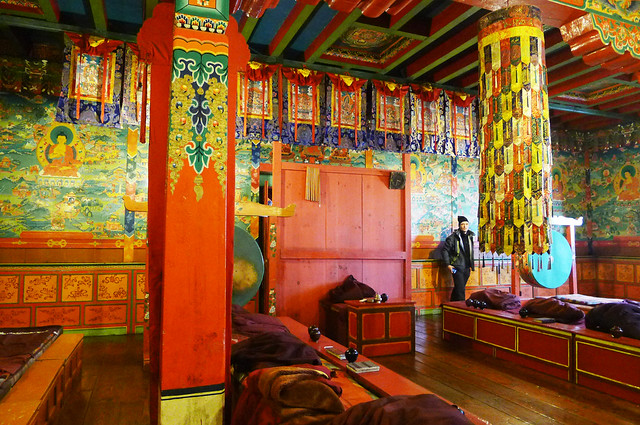 |
| Tengboche Monastery's prayer room with its intricate interior art |
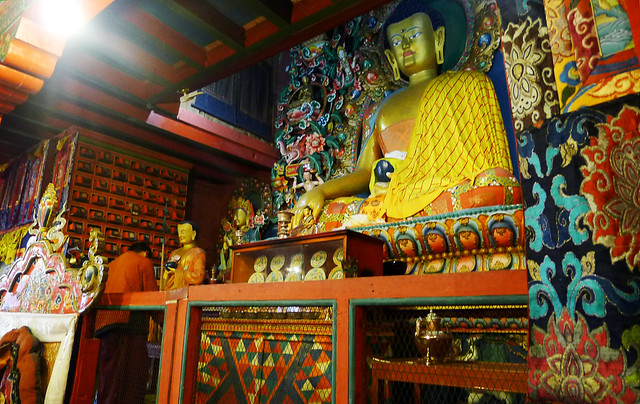 |
| A shrine on one end of the prayer room |
Reaching Lukla -- and the Delayed Flight Back to Kathmandu
The air became significantly warmer in the last two days of the trek. Stuffed my gloves, wool hat, and fleece jacket into my day pack as we went past Monjo and were nearing Lukla. We covered around 7 to 8 hours of trekking that last day.
When I did my final uphill and crossed the archway leading into Lukla, I was close to tears because I had really, truly completed what I had obsessively set out to do. I suppose Everest Base Camp puts every trekker in a highly emotional state. I know I was feeling all sorts of things as I crossed that archway --triumph, exhilaration, exhaustion mixed with an unusual feeling of superhuman strength, and even a growing anxiety over bidding the Himalayan landscape goodbye very soon.
This 12-day experience remains to be one of my life's proudest moments, because not everyone can say they've been there and done it. It is naturally not the same as the sweet victory of summiting Everest, but hey, Everest Base Camp is still not an easy trek and it never will be.
We stayed again at The Nest in Lukla, and had a celebratory pizza and pasta dinner that evening. Madan was to fly back with me to Kathmandu the next day but I knew it was Dhan Kumar's last night with us, so I was feeling some sort of separation anxiety already about my porter, who was like a younger brother to me all throughout the trek.
But then, I was meant to stay another day in Lukla because as luck would really have it, there have been no flights out of Lukla for the past 7 or 8 days. I woke up the next day and knew immediately, upon seeing the thick fog that enveloped the entire town, that flying out on a plane was a no-go. This was a scenario I was indeed expecting months back when I was planning the trip, but I still had trouble believing I was in that unfortunate situation.
Spent that day fretting and making calls to my travel agent, who was on standby to rebook my international flight should I really be stuck in Lukla for a while. Madan was on the phone with Naba, coordinating for a possible helicopter ride out the next day for me. He also made sure that I was on the first flight out the next day, should the weather indeed allow planes to fly.
Once more, I really appreciated the value of having a guide and a trekking agency to handle such logistics in my behalf. I think many trekkers can do such arrangements themselves, but that does create some additional stress. And when you've just completed a 12-day trek and you're physically and mentally exhausted, one of the last things you'd feel like doing is arranging transport logistics for a way out of Lukla.
Unbelievably enough, the skies were clear the next day. Madan and I found ourselves rushing up the steps heading to the Tenzing-Hillary airport of Lukla along with other stranded trekkers and locals -- all of us so eager to fly out to Kathmandu. I was only stuck in Lukla for a day, but I can just imagine how others (who may have been stranded for days and could not afford a chopper ride) were desperate to leave. When the siren sounded--indicating that the first flight will proceed as scheduled--everyone in the airport actually cheered.
Never expect things to be completely dull up in the Himalayas.
The first plane came and landed, bearing passengers from Kathmandu. We were to ride on that plane heading back to the capital. The time it took to land, taxi, for the ground crew to handle baggage and for the outbound passengers to finally board took all of 20 minutes. TWENTY MINUTES! Gadzooks. I had never seen such incredible turnaround time ever. And by the time we were boarding, the second plane had arrived and was taxiing up the short runway.
 |
| Boarding the plane for the flight back to Kathmandu. Bye bye Lukla! Bye bye Himalayas! |
The Nepalese language does not have any exact word for the term 'goodbye.' This seems wonderfully appropriate somehow because one can never really say goodbye to Nepal anyway. Namaste means hello in Nepali, and it is also what the locals say as a form of goodbye. And pheri bhetaula means 'see you again.'
So yes, there are no goodbyes for you, Nepal -- just 'namaste, pheri bhetaula' because I know that I'll be seeing you again someday.
* * *
If you want the same Everest Base Camp trek experience I had, visit Himalayan Planet Adventures and go for the 16-day Everest Base Camp trek package.
